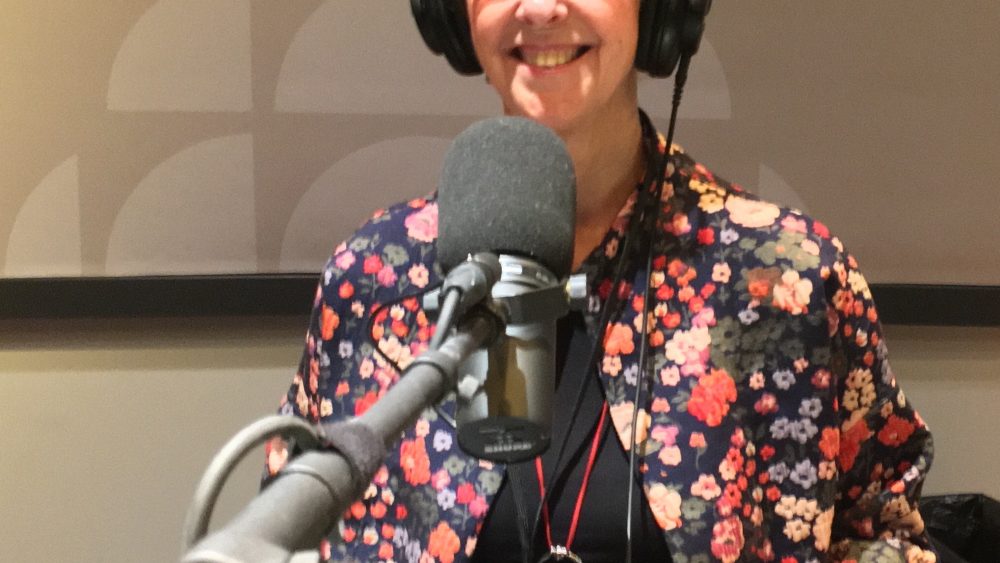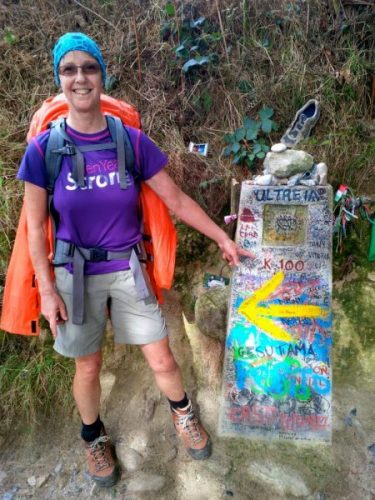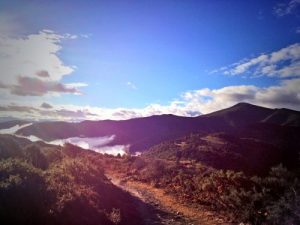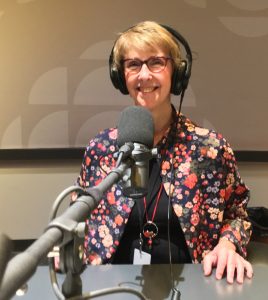In part, I’m writing this memoir for those who need to see someone standing strong farther down the road they’re travelling.
In February of this year, I stood transfixed in my living room listening to my Camino story on CBC Radio’s The Sunday Edition. I hardly recognized my own voice, which sounded like it had received the audio equivalent of airbrushing. But even though I knew the story, I was almost in tears. I had written something that, to me, felt remarkable.
Then came the annoying voices in my head: How will I ever write anything this good again? And did I really bare my soul and tell Canadians I’d been married and divorced twice, that I was a cancer survivor, that I was insecure and afraid? It was all true. The Camino de Santiago, a legendary network of pilgrimages leading to the shrine of the apostle Saint James the Great in northwestern Spain, wasn’t just about the physical journey. I had travelled an emotional distance as well.
But within minutes, emails, texts, and Facebook messages poured in from friends and family congratulating me on both the writing and vulnerability of the piece. The story resonated with Camino pilgrims, cancer survivors, and people alone again in midlife. I was reminded that the reward for revealing myself is connection—that we are all more alike than we are different.
Ten days after my essay aired on The Sunday Edition, a CBC video producer approached me for their new YouTube series, This Happened to Me, about pivotal moments in people’s lives. Andrea thought my story might be a good fit. She shared a concept video showing a person speaking to the camera, against a black background, with graphic animation enhancing story elements.
“Will I read from a teleprompter?” I asked a little nervously during our initial phone call.
“No. I’ll ask questions, and you’ll answer. Think of it as a conversation.”
Like many writers, I’m an introvert. Over the course of my career, I’d learned to deal with media and conquer my public-speaking jitters. But I’m still more comfortable writing and reading my own words, especially words I’ve had the chance to polish to perfection.
“It’s best if you don’t repeat the essay you read on The Sunday Edition,” added Andrea. “If you’re trying to remember words, your eyes will dart all over the place. You’ll look nervous.”
We would shoot the video against a green background, she said, to allow for layering in the animation. Green is the colour of choice, I learned, because it doesn’t match any natural skin tone or hair colour. “You’ll sit on a stool and be filmed from the waist up, so wear a colourful top.”
“Will hair and makeup people be available?” I asked, only half joking. As a woman of a certain age, I was worried the camera would magnify my wrinkles and exaggerate my sagging skin.
“Maybe. We’ll see who’s around that day.”
I had never expected to share my writing so publicly. During my first creative writing class four years ago, feedback was positive when I wrote stories from my own life. My classmates were fascinated by my sudden cancer diagnosis at age thirty, and the experimental bone marrow transplant at Princess Margaret Hospital that cured my leukemia. That experience provided a natural story arc, and I began to write my memoir about life and love after cancer. I wasn’t sure about publication.
“What’s so unique about your story?” editors asked me. Agents challenged me to articulate what my angle is, because “cancer memoirs are a crowded category.” Still others advised, “It’s all about the voice and the platform.”
While I don’t have all the answers, I do know this. Over the past three decades, when I’ve shared my story with cancer patients, survivors, and their families, the words I hear most often are “inspiring” and “hopeful.” In part, I’m writing this memoir for those who need to see someone standing strong farther down the road they’re travelling.
Arriving early for my interview, I blended into the crowd gathered in the CBC Building main floor atrium. Surrounding the stage were video screens, banners, and multicoloured lights suspended from scaffolding. It was International Women’s Day, and a panel of influential women in Canadian sports were discussing the current state of the industry.
Upstairs, Andrea ushered me into a small dark room with a green screen that spanned the room’s width. I met the cameraman, and the three of us chatted casually while he set up two small cameras on tripods about ten feet away from where I sat—one directly in front of me, the other slightly left. He rotated the large foam-covered microphone hanging from the ceiling, and moved lighting stands, adjusting height and flaps to absorb or reflect light. Fascinated, I watched and sipped water to pre-empt a dry mouth. After a quick sound check, we were ready.
Andrea stood behind the camera in front of me, and asked the first question: “Why did you walk the Camino?” She seemed genuinely curious about my experience, which relaxed me. I answered. Then, disregarding my original story flow, she jumped around, heading off on tangents, at one point asking me to expand on something I had mentioned—the rainy days—which made me laugh later when I saw it on video. A few times, I got tongue-tied and held up my hand to stop, take a break, and drink more water.
Eighty minutes later, the interview ended. I then recorded the introduction I’d pre-written: “I’m Margaret Lynch, and five years ago I walked the Camino de Santiago pilgrimage in Spain to celebrate the 25-year anniversary of my cancer survival.”
Andrea told me she’d edit the footage down to six or seven minutes, then the graphic artist would add animation. The cameraman thanked me for sharing my experience, telling me he, too, wanted to walk the Camino someday. I would not see the video before it aired.
I left the studio that day with absolutely no sense of what the final version would look like, or how I would appear on screen. I reassured myself that if I didn’t like the result, I wouldn’t share the link. Nobody else would ever see it!
On May 9, the video was posted to CBC’s YouTube channel, available for online viewing anytime. After the initial shock of seeing myself, I was swept along by the story. The editing impressed me—how the narrative was stitched together, how well it flowed. I was wowed by the animation, which beautifully (and sometimes humorously) illuminated my words.
Both CBC and I shared the video on social media, and to date it’s been viewed more than 20,000 times on Facebook, Twitter, and YouTube. I am amazed and humbled at the appreciation expressed by people I know, and those I don’t.
I always believed my memoir would resonate with people who’ve been touched by cancer, but I’m gratified to learn there’s also an audience outside that group. This is not just a story about cancer. It’s a story about life after cancer—which is just life, and yet more, because after cancer there’s a compelling reason to stop putting what matters off until tomorrow. Readers and viewers consistently use words like “moving, inspirational, motivating, and powerful.” My story reminds people to be fearless.
I had to tell myself this again when I wrote and pitched an essay to the Toronto Star for National Cancer Survivors Day. It was published June 1, and described the emotional journey I’ve travelled these past three decades, how giving back to the hospital that saved my life helped me. I have cycled hundreds of kilometres and raised thousands of dollars for Princess Margaret Hospital—because there are not enough ways for me to say thank you.
Over the past seven months, my stories have been read, seen, and heard by tens of thousands of people—neighbours, friends, family, fellow writers, cyclists, former colleagues, friends of friends, and people I’ve never even met. When my Camino story was re-broadcast on CBC Radio’s The Sunday Edition in August, a listener went to some trouble to seek me out and tell me how much the piece resonated.
Suddenly, I have a platform.
I’ve gradually gained confidence in my writing and the power of my story, in part through my acceptance to the MFA in Creative Nonfiction program at the University of King’s College in Halifax, and I’m excited that in a few months my manuscript will be finished. Then it will be time to harness all the positive feedback and energy from the past year and pursue publication. When I share my story as a published memoir, as I hope to do, it will be one more way to give back.
MARGARET LYNCH is writing a memoir about life and love after cancer. She is in her final year of the MFA Creative Nonfiction program at the University of King’s College in Halifax, and holds a Creative Writing Certificate from the School of Continuing Studies at the University of Toronto. Excerpts from her memoir-in-progress have garnered writing contest honourable mentions, and she’s read several pieces at open-mic sessions. Her personal essay about walking the Camino de Santiago in Spain was broadcast twice on CBC Radio The Sunday Edition (February and August/2019) and reprised as a video for CBC Radio This Happened to Me (May/2019). Recently her personal essay about life after cancer was featured in The Toronto Star for National Cancer Survivors Day (June/2019). Another memoir excerpt, “Witness,” will be published in the upcoming issue of untethered, a Toronto-based literary journal.
Margaret began writing her memoir in 2015, following a successful career working with major brands in private sector and non-profit organizations. An accomplished digital marketer with an active social media presence on Facebook, Instagram, Twitter and LinkedIn, she blogs at www.mmlynchwriter.com. As a grateful cancer survivor, she fundraises, volunteers, and speaks on behalf of Princess Margaret Hospital and the Leukemia and Lymphoma Society of Canada. Based in Toronto, she is a life-long learner and a curious traveller, who can be found on roads off the beaten track in Asia, South America, and Europe.
A pilgrim’s journey: This woman hiked hundreds of kilometres to find peace (CBC’s The Sunday Edition)
What’s wrong with me?: I found the answer on the famous Camino trail (This Happened to Me; CBC, YouTube)
After cancer the fear never leaves you, but she’s fighting back (Toronto Star)



